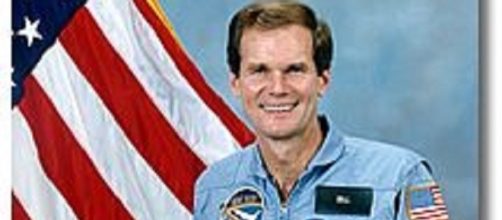When President Donald Trump announced, as had been expected for months, that he intended to nominate Rep. Jim Bridenstine, R-Oklahoma for the position of NASA Administrator, Sen. Bill Nelson, D-Florida reacted somewhat negatively. He suggested that it was inappropriate to nominate a “politician” for space agency chief, but rather a “space professional” should be named instead. However, Sen. Nelson is already getting some pushback, via the NASA Watch blog, because of an instance over 30 years ago when then Rep. Nelson used raw political power to get a ride on the Space Shuttle.
How Bill Nelson became an astronaut
Back in the mid-1980s, before the Challenger disaster, NASA was contemplating allowing a variety of civilians to ride on space shuttle missions. The Teacher in Space program, which ultimately led to tragedy, was part of that initiative. Eventually, journalists, artists, and others would have found themselves flying in space on the shuttle.
Nelson, then a congressman suggested to NASA that he would be a worthy candidate to fly on a space shuttle mission. Since, as the result of committee assignments, Nelson had lots of influence over NASA funding, the space agency readily agreed. Nelson flew on the mission of STS-61-C as a payload specialist, commanded ironically by Charles Bolden, the future NASA administrator.
Ten days later the Challenger was destroyed in the skies over Florida soon after takeoff, changing forever the way the space shuttle fleet was operated.
How much trouble could Nelson make for Bridenstine?
Nelson could make lots of trouble for Bridenstine’s nomination should he chose to do so. He is the ranking member of the Senate Commerce Committee which would hold hearings on Bridenstine’s appointment. Even if he did not get enough votes to block the nomination, Nelson could draw out the process,
The question arises, what is Nelson up to? Bridenstine may have bought himself trouble with some Democrats for being a climate change skeptic. However, Nelson has never been at the forefront of the climate change movement.
As far as NASA is concerned, what is good for the Kennedy Space Center in his state is good for Senator Nelson.
The problem is, nothing that Bridenstine has proposed is going to hurt KSC. Indeed, his advocacy of a return to the moon using commercial partnerships will likely have the opposite effect, increasing activity at America’s space port, with the attendant effects on jobs creation and economic growth. Bridenstine is popular with both NASA supporters and commercial space advocates.
Nelson has not said that he will oppose Bridenstine’s nomination. However, one can be forgiven for thinking that some sort of price will be exacted for his support.


